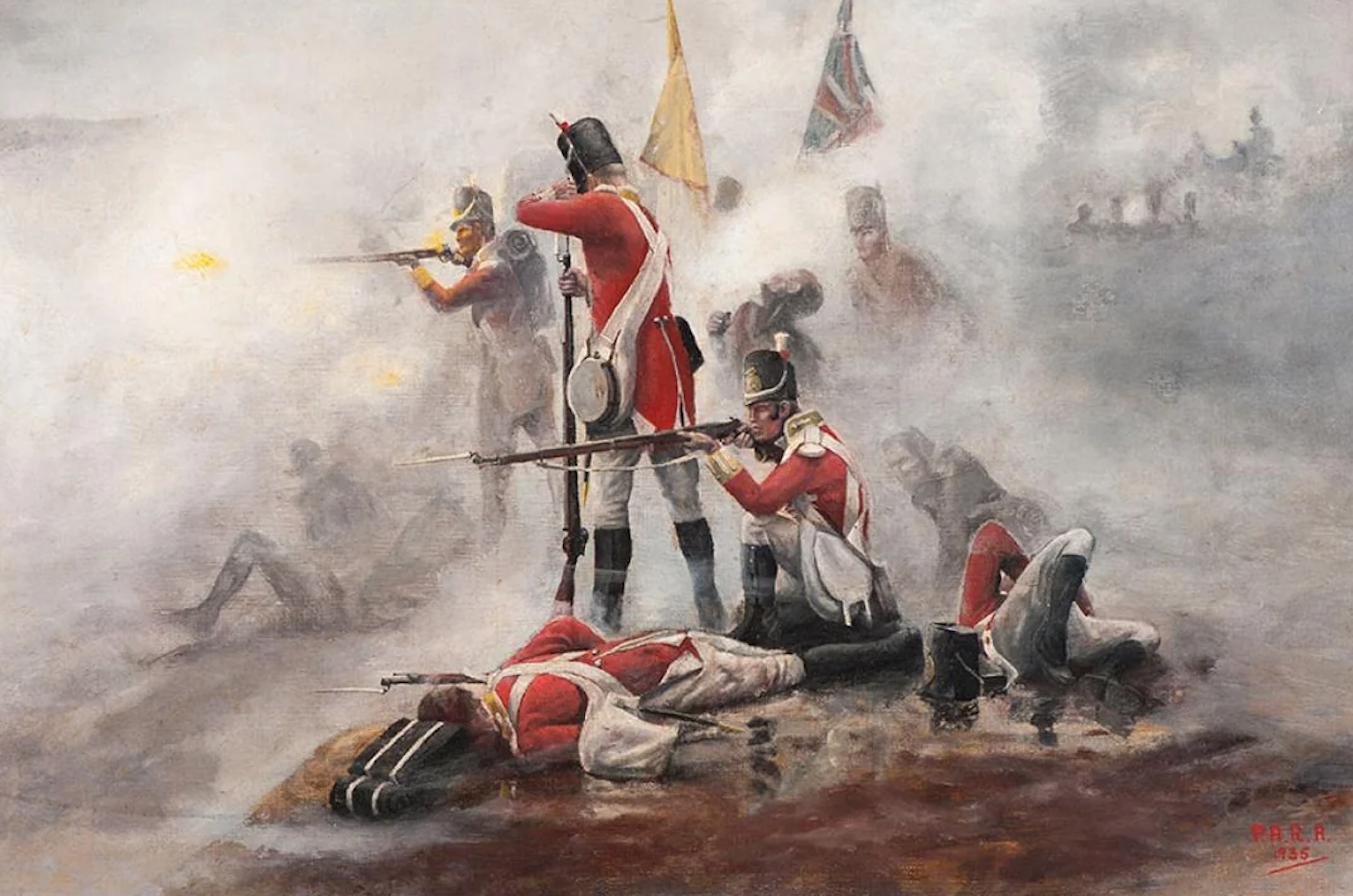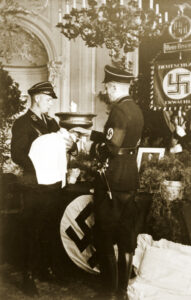Read this site’s featured article.
“Democracy is a false idol, a mere catchword and illusion of inferior classes, visionaries and dying civilizations.”
—H. P. Lovecraft
Fog

This oil painting The Fog of War hangs in the Officers’ Mess of the 1st Battalion, The Princess of Wales’s Royal Regiment. It is a striking reminder of the consistency of the chaos, confusion and sacrifice that exists in battle.
The problem with ongoing wars is the fog of war: how to see beyond the propaganda, disinformation, and fake news (as we in the West have suffered for four years from the MSM regarding the war in Ukraine)?
There is a very reliable source, which is also a joy to listen to because it’s audio-visual. I’m referring to the geopolitical analyst Alexander Mercouris (his episode from today can be seen here), and another YouTube channel, The Duran by Alex Christoforou, who interviews Mercouris daily (watch today’s interview here). The latter is the one I enjoy watching because the conversation is lively, unlike Mercouris’s drier monologues when he speaks alone on camera.
In general, The West’s Darkest Hour doesn’t focus on the news unless events occur that could potentially shatter the System, and as I mentioned the other day, one of the possible outcomes of the US-Israeli war against Iran could become music to our ears…
 Since I’ve been talking not only about the Neanderthal Predation theory but also about Danny Vendramini’s teem theory, I’d like to add that it’s worth reading the preface to Vendramini’s second book.
Since I’ve been talking not only about the Neanderthal Predation theory but also about Danny Vendramini’s teem theory, I’d like to add that it’s worth reading the preface to Vendramini’s second book.
“Those whom the gods wish to destroy, they first drive mad,” the ancient Greeks said.
Since 2011, I’ve been waiting for the fall of the American empire, primarily responsible for the defamation of Hitler’s Germany, but without knowing when its beloved dollar—the ultimate source of its power—would collapse.
 I didn’t think Trump would be so mad as to obey Bibi and attack Iran. But since, as a result of today’s attack on Tehran by the US and Israel, Iran has closed the Strait of Hormuz (disrupting the global oil supply), this war could very well become the pin that will burst the monetary bubble that the Federal Reserve has been inflating since 1971.
I didn’t think Trump would be so mad as to obey Bibi and attack Iran. But since, as a result of today’s attack on Tehran by the US and Israel, Iran has closed the Strait of Hormuz (disrupting the global oil supply), this war could very well become the pin that will burst the monetary bubble that the Federal Reserve has been inflating since 1971.
This is magnificent news for The West’s Darkest Hour! If things go as I imagine, this war will bring an end to the interregnum, a Pax Americana that began in 1945 by imposing an anti-Nazi Diktat on the entire West through propaganda monopolized by Jewry.
P.S. of March 1
The financial war
[Abstract of Alasdair Macleod’s article:] US and Israeli attacks on Iran have undoubtedly been well planned with Mossad assets on the ground. Whatever the outcome, it will become a financial war against the US dollar.
It would appear that in America and Israel the lunatics are running the asylum. Against all common sense, and one understands senior military advice, President Trump in league with Benjamin Netanyahu decided to wage war against a very large country, Iran. Effectively, Hormuz is closed because there will be no traffic into and out of the Gulf, driving oil prices sharply higher. Inflation expectations will rise, if only on the back of oil prices, stock markets will be badly hit, and precious metals soar…
If you want to subscribe to Macleod’s site, read the rest of the article: here.

Gender is one of the most important words in contemporary Newspeak. Anyone who doesn’t understand this psyop won’t understand the psychosis that has been unleashed in the West to destroy the white race.
Benjamin to a penpal:
My perspective on the gender revolution? Well, I hope it doesn’t offend you—I’m very much not a progressive on it, though I think I’m more nuanced than your average conservative, i.e. right winger, at the same time:
I think ‘gender’ is a superfluous word; a creation no more than literary, that has no mapping to extraneous reality outside of the fantasies that invest so much in it. Like me inventing the word ‘feckewok’ and using it for advantageous purposes, making up a set of intrinsic properties from whole cloth to accompany this most abstract of ideas – perhaps whatever most appealed psychologically – like designing a ‘fun’, fan-made rule book update to Magic: The Gathering. Thus, I’d like the word ‘gender’ banned from the dictionary (unless one is dealing with the categorising of the nouns of foreign languages such as Latin, where you’d have masculine, feminine, and neuter; an entirely different—and valid—context).
I think the actual word we mean is ‘sex’, to describe the physical reality available on empirical evidence of there being males and females (and a handful of intersex, of which I really do mean a small handful legitimately, as the likes of Klinefelter Syndrome XXY’s are officially considered male; what I mean is, there’s very, very few genuine hermaphrodites).
I think it’s a trendy idea that has caught on because it effectively facilitates, promotes and normalises the cult of hyper-individuality that accompanies early 21st Century liberalism, mixed to the narcissism of the ‘lookit me!’ generations (millennials, and about half of zoomers).
As usual, I would say this destructive hyper-individual drive came about through the impact of historical Christianity on a race already primed to be fairly insular and non-cooperative at the best of times (where all must then be concerned in isolation with the saving of their individual soul; originally, only warped somewhat by the shift into godless postmodernism and secular ‘neo-Christianity’ post-French Revolution, the Enlightenment having been no more than a pseudo-apostasy).
Devastating to me, it also significantly lowers the bar on what can be considered evidence, and denies the physical world, at least as it can be objectively viewed. To remember Christopher Hitchens, positions put forward without evidence can be dismissed without evidence!
I don’t think it was a natural change. I think it was a calculated, civilisation-destroying move, of the Frankfurt School (etc.) variety, and generally, I think it is anti-white (in that in the long run it distracts from families and new life, instead pulling us into the cult of the self, a short circuit on fertility in historical conditions where we are under intergenerational population collapse—coupled to a morbid, materialistic, anti-natalist zeitgeist).
So yes, in a nutshell, I certainly do think they’re all deluded. Whether this comes about (at least in part) from child abuse or not is of great interest to me though, and I would like to know what percentage of cases that part is.
In general, when it comes to, just for example, transsexual individuals, I have a great deal of genuinely pity for them as I recognise them as trauma cases. If our society was not so stupid, ignorant, and pig-headed as to do nothing but encourage their increasingly legally-unfalsifiable (and unstoppable!) delusions, instead of digging beneath the surface a little (or actually, you know, asking them perhaps?!) it might be able to help them better.
Not help them to hoodwink the rest of society with obvious bullshit, under pain of draconian legislation; a sycophant’s most negative idealism. But help them to address where this bodily dissonance – this mental ‘dysphoria’ – comes from… what happened to them basically… it’s my personal theory that a great many were horrendously abused, and, as we know from the massive research contribution of independent psychologist César Tort, most abuse is parental.
Abuse victims need help, not persecution. I think the reason more do not come forward with this—true—understanding, is that they have repressed it to survive, and thus it has sunk into their subconscious, only to appear in other forms i.e. misdirected rage (at targets other than the perpetrators), thinking of the number of school shooter cases recently from this general ‘tranny’ demographic.
As for whether it was prevalent in the (Upper) Palaeolithic… I don’t think so (I can think of no fossil evidence that could verify this). I would suspect not. I think they had very firmly segregated gender (i.e. used in its strictest sense, as a synonym for sex, i.e. m or f) roles, and a real sexual dimorphism physically and culturally, particularly as the Levant populations (Skhul-Qafzeh) underwent to swift biological ‘revolution’ into becoming Cro-Magnon instigated by the predatory impact of the Neanderthals on them (i.e. females very female, males selected to be very, very masculine). The evolutionary biologist Danny Vendramini writes about this topic. It would basically have rendered them maladaptive to their environment to waste time on navel-gazing over whether their mental picture of their body matched the reality of their body.
Does this make sense? That last line kind of sums it up for me. Given that someone can be wrong, just on probability, I don’t automatically trust their self-reportage, no matter how vociferously they try and put it to me, or the meltdown they suffer in tantrum if I refuse to facilitate their lie. It’s a case of the emperor’s new clothes, if you remember that fable. I don’t think that has changed from the Palaeolithic right up until now.
I just don’t think its adherents and devotees want it to be empirically false, and would rather throw truth, empiricism, and biological reality out the window than be wrong—which does suggest severe malignant narcissism to me, or at least an infantile mindset with a psychopathology of some sort—and remember, I keep ‘mental health’ in the realms of the psychologically-imposed (the Trauma Model of Dr Colin Ross), and do not go in for dopamine/chemical imbalance bullshit-theories either.
As with the right on many of its issues, the left is equally dogmatic in my experience on this particular matter, so I wouldn’t usually expect anything more than doubling down. To me this just highlights how many people there are willing to self-delude in this country/planetary hemisphere, often simply in a fake act of being ‘nice’, or ‘tolerant’. I think I’d rather be honest.
Basically, if their mental picture doesn’t match the biological reality, why does it never occur to them that this could be because of a certain delusion? Surely that’s the basic definition of psychosis! And psychosis is the severest symptom of sustained environmental trauma.
I don’t think it’s kind of the corpus mentis crowds to mock psychotic patients. I don’t think it’s kind of them to validate them on their delusions either, if the want them to get better. I blame ignorant society very much as a whole for screwing up a sensible solution to this issue, which I think otherwise could have been nipped in the bud (an issue which I know does bring people some pronounced pain, if only behind their mask of proud frivolity).
In the future I’d hope for a more genuine trauma-based psychotherapy for anyone who came out with these ideas (currently unavailable as gender zealots and liberal ‘cultists’ have ruined the open-minded impartiality of clinical psychology in general).
Anyway, that’s my initial thoughts on the matter. Thank you for asking me.
Neutron
“It had to happen to someone. There is nothing exceptional about you, any more than there is about the first neutron that starts the chain reaction in an atomic bomb. It simply happens to be the first. Any other neutron would have served—just as Jeffrey might have been anybody in the world. We call it Total Breakthrough.”
― Arthur C. Clarke, Childhood’s End
I’d like to say something about my seemingly mysterious comment yesterday to Thomas (“if people like you and me could reactivate the Cro-Magnon teem…”).
I was inspired by the 1953 novel quoted above, where two mutant children unleash a chain reaction with apocalyptic consequences for the world.
Of course, the quote in Clarke’s fantastic novel refers to developing paranormal powers, and I’m referring to something quite different. But the metaphor is clear: two priests of the sacred words could potentially infect, with their newfound faith, dozens, hundreds or thousands of Aryan males in the future—a chain reaction—, and the consequences would also be eschatological.
For many years, Childhood’s End was my favourite novel. That ended when I awoke to the fact that the Aryan race is dying. But following the metaphor of the quote, it is possible to reactivate the Cro-Magnon teem (an exterminationist archetype): the goal of this site.
Regarding the person who developed teem theory, this morning I couldn’t let a comment criticising him because it’s clear he hasn’t read Them & Us. This commenter, who had already been banned, claimed that Neanderthals were capable of weaving clothes.
Let’s remember that just as neochristian anthropologists have massively projected their evolved selves in a quixotic undertaking to humanise their noble savages, many of whom were cannibalistic infanticides (cf. my book’s chapter here), neochristian paleoanthropologists do the same: they project their own psychoclass onto the prehistoric past so massively that it borders on psychosis: like putting diapers on a doll representing a supposed Neanderthal child in a museum. It’s crucial to understand how more serious scholars debunk things like Neanderthals weaving clothes or carrying flowers to their burials (a critic of that claim said that pollen found in a cave could have been carried there by an animal, not for ceremonial obituaries).
It’s a terrible mistake to believe that academics are lying about events like BLM (“the rioters cannot be infected by Covid viruses,” etc.), while believing that they are honest when writing their papers about the prehistoric past. They are the same usual suspects, and what motivates them is not objective science but anti-white hatred, the idealisation of non-whites and the defamation of the latter.
I’ve also received emails complaining about the author of the NP theory, which show that the correspondent hasn’t bothered to read Vendramini’s book. They remind me of another banned commenter who recently dismissed Tom Szasz’s critique of psychiatry because he had a Jewish ancestor, or Michel Foucault’s critique of the same profession because he was homosexual: perfect ad hominem arguments, very common in the racial right. One of the problems with the new generation of racialists is that they don’t read books, even though it’s impossible to think deeply about a subject without reading them. But all this is beside the point.
The point is creating a community of priests of the sacred words from where it’s possible to try to produce that chain reaction that would infect the white race with a Cro-Magnon-like exterminationist passion that ensures its survival.
 In these communities we would have temples like the one pictured above and rituals to “baptize” newborns in the new faith that commemorate those who bravely, though unsuccessfully, tried to force the eschaton into history. Following Savitri Devi’s philosophy, Hitler was not the equivalent of Jeffrey Agnus Greggson in Clarke’s novel, only his precursor, although every ritual within the post-Christian temples would commemorate his official photograph and symbols.
In these communities we would have temples like the one pictured above and rituals to “baptize” newborns in the new faith that commemorate those who bravely, though unsuccessfully, tried to force the eschaton into history. Following Savitri Devi’s philosophy, Hitler was not the equivalent of Jeffrey Agnus Greggson in Clarke’s novel, only his precursor, although every ritual within the post-Christian temples would commemorate his official photograph and symbols.
Hellish island
by Thomas 2

Children of men by anti-white Alfonso Cuarón was filmed in the UK.
Yes, it is terrible, being here. I deliberately walk around the quieter end of the village, and even then now and again, I encounter a non-white, usually in uniform (the port security employs many, ludicrously, plus all the new local takeaway outlets, plus all their Just Eat drivers: which historical nation until now trusted their direct ancestral enemies to prepare and deliver them their food? But we are this lazy!). Either that or a burqa-clad mother, with pushchair and accursed brat on her arm—always a very disconcerting sight to me. I notice they at least usually stick to the urban side of the village; these creatures have no natural interest in the wilds. I have never seen them among the trees, mercifully.
One Englishman cares (not that I always did enough—I’m not innocent either). Unfortunately, it seems I am alone here, adrift along the edges of horrible shores. Sometimes I wake up and step outside my front door, a scant metre past the flimsy mantle that is our house, staring at the sickly yellow sky, with a murky winter’s sun, a weird, suppurating light suitable for a lost seaside backwater (a locale where people disappear like albatrosses into a liminal fog), thinking about it all: ‘this place… this f**king place…’
Britain is lost everywhere; some foreign rock. I can only really shrug (knowing that snapping and flinging myself into the System headlong is off limits, so I shouldn’t go there – won’t ever) and then dig in, with my provisions around me for as long as I need them, perhaps cynically, or perhaps just in harsh, disappointed acceptance, and wait for their idiotic ‘remigration’ plans to fail and their ‘full proof’ shiny new election-friendly leaders to falter and prove useless at their word, and all orthodox political ‘resistance’ to crumble… and to re-evaluate the citizens then, (perhaps from far away, if I am fortunate), when we know every last inch of their bullshit and excuse-making capability has been stripped away from them, when they can (and as they are scum, it will take brute force!) no longer countenance contriving these lofty phantom escape-hatches for themselves: that endless imaginary ‘resource’ of easily-bought others doing their dirty work for them (and by the book); when reality is whipping them back, finally, when their oldest stance and possession – their cowardice – is denied them under pain of death (it shouldn’t have to take this long). I am aimed to hate my people. They have hurt my pride – my pride in my own race!
I hope the ‘Orcs’ will be driven from here, and from everywhere, with such brutality and with such steel hate. But in this meantime I’ve had to give up on the citizens of the UK. They’ve done their best so far (and it isn’t anywhere near good enough). Later most can die. I’m glad I have my garden and the (little) wilds I talk of and enjoy, and then all the expanse of woods and hills and fields as far down as Manningtree and beyond. That’s my pleasure in this country (and I’m so glad it doesn’t interest them – ‘friend’ or enemy nigh-on alike).
Maybe later I can find a sense of love for my own people again. For the moment I’m just indifferent. They’re not quite enemies, but they are just worthless. I keep this to myself most days—but I think a lifetime of dealing with the perennially irresponsible retinue the defines the scope of my interactions, from [***] and [***] to [***] (though I struggle to always include the later, as the best friend here I’ve got, damage notwithstanding)… of dealing with all these f**king fools, has encouraged me to see Aryan life—much as it’s the most vital of idealistic futures to preserve it (and so I know there are good people I cannot see here even now)—as temporarily expendable, and already somehow corpses prone on the soil of England. They should get up again all by themselves, if they do! Should I try to forgive them? I can’t think why! Still, darkly, I’d find it worthwhile to address them with a few of those planned podcasts, provided my/our timing is satisfactory for that.
I don’t really think I’m much better as a person. But I do care what happens here, to the conclusion of that line of thinking, in a big, grumbling sea of people who don’t. I’m like Mark Collett once remarked on (albeit disapprovingly): I’ve scowled so much at them I’ve altered my face.
Maybe that’s why—just for me—my woodland experiences exist. As something to fall back on that always lasts, even when the people are gone. It will always be a pleasure in itself, as I like nature. It will do I think, for now. It’s beautiful, and stark, and then more rounded as summer comes on. I’m glad you too have good scenery and intriguing animals. I fear for nature perhaps more than I fear for the citizens here though. I wish I did have just one other person here on my wavelength… so I didn’t give up on the island’s race. Already they feel a little cloudy to me—too many months of stifled misery analysing them. Only the muddy wilds feel real. I used to find Savitri’s ‘wingless bipeds’ expression a little risible in its ridiculousness. The ridiculous element isn’t funny though. Now, I share her abyssal contempt, and understand the sentiment emotionally.
Maybe it’s just the way it is that I never will have that though; maybe it’s best for me, to keep me on edge, or radical. I can’t imagine how hard your own life-time (!) of genuine solitude has been on you, and I hope I don’t patronise you saying that. At least I have—well…—some closely-placed bodies around me long-term, even if they don’t see me and I’m drained and irritated seeing them. I think it’s how you’ve come to your wisdom though, through all that pain and harrowing opportunity for self-reflection, as Solzhenitsyn reflects on regarding prisoners. I’m certainly glad I have you as a friend, long distance. It provides my life with a sense of an heroic mission, however much it’s as if ‘mission: impossible’ currently (and could just be tragedy)!
I’ll have to end this soon. I get so weary as I think of this country—I do best on a sort of grim autopilot. It’s something too… awful, to really be delved into cognitively for any length. I genuinely don’t like writing about it; it sends my head foggy.
Alas for your country indeed, in that ugly mud-pool of troll faces, too many by far (much as one would be too many also). Alas for ours… where the people are biologically pure and clean, on the whole, and yet so far empty; surrounded and subdued, quite happy on their knees.
Death to the traitors on the right who have eased the burden of their complacency over this! Death to the idiot left, for their petty roadblocks, and pampered favours and perversions! Something will happen here, I’m sure of it, or I wouldn’t waste these words.
As I shared to you briefly on WDH some while back (I think it disappeared), I am glad for the Orcs being here as only I can be, despite never having had a choice. Bring them, and more to these dead age killing grounds, and eviscerate them! Their hubris, their mistake! Torch their piled bodies from the whitest cliffs, as a small measure of our welcome to these alien beasts, these unsound f**king remains. That is our duty, no matter how distant or unrealistic it may seem. And it shall be a pleasure then, for as long as the enemy lasts to despise.
The situation, I gather, is naturally more complicated than my daydreams can accommodate for. But I hope to at least see carnage, in my own lifetime.
I will mourn not being here, if anything, which I think is understandable, and I will never get over the disappointment of that. However, I am realistic I think. As long as others do this and this happens, so what? I take your recent shared words of Adolf Hitler to heart here on the importance of the collective only.
That’s my thoughts reflecting on what is sacred in these lands, and on what will be again.
Webbon’s
interview – 9
In the ninth episode, Joel Webbon is far more concerned that Vice President JD Vance married an Indian woman because of her Hindu religion, than because of her Indian blood.
Vance, of course, committed the sin against the holy spirit of life by procreating with her, but since neither Nick Fuentes nor Webbon are priests of the 14 words, they don’t see things our way.
Fuentes has a better view of the vice president than Webbon, pointing out that in his biography, Vance said he married the Indian because he wanted to marry as far away from his relatives as possible!: the quintessential racial traitor.
Why haven’t white nationalists rejected democracy, considering that it is the preferred system of the Jews, and that in 2024 the presidency could be won by someone who committed the unforgivable sin?
Pruned
“Civilisation must not exist to promote the development of culture, technology, luxury or comfort but to promote the development of man himself: the evolution of the genetic code. For civilisation depends on genes, not the other way round. It is ridiculous that civilisation turns against the genetic heritage that created it, like a snake that bites its tail.”
—Eduardo Velasco
As promised yesterday, I’ve pruned Eduardo Velasco and Valg’s article. I’ll now delete the PDF of the version of The Fair Race’s Darkest Hour that included the appendix with the minor changes I made on Friday. The updated PDF of The Fair Race is now linked to the featured article. I’ve also edited my explanatory note at the end of Velasco’s article:
The preceding article was originally published in Spanish by Eduardo Velasco on July 28, 2009. Many images, including a complex phylogenetic tree summarising the new racial classification, have not been included in this much abridged translation. Most of the endnotes from the original text have also been removed, although some have been merged into the main text.
Lack of funding prevented researchers Valg and Velasco from writing the second part of the new racial classification. It is impossible to evaluate their classification scientifically because physical anthropology has been corrupted since 1945. Had the Third Reich been allowed to flourish, there would now be a constellation of anthropologists, from the Atlantic to the Urals, who would have developed this science, and numerous articles would have been published in specialised journals.
After Valg and Velasco disappeared from the internet, following the censorship of the Evropa Soberana website, we believe that pondering the origins of the white race should be done taking into account Danny Vendramini’s Neanderthal predation theory.
The pruned article can be read here.
Postscript
to my previous post
As I begin rereading the appendix to The Fair Race this morning I realise that, due to the timeline, it’s impossible to reconcile Danny Vendramini’s findings with the study by Eduardo Velasco’s collaborator, Valg (not Varg, as I mistakenly wrote the previous days).
According to Vendramini, European Neanderthals began invading the Levant around 100,000 years ago and preyed on pre-humans for 50,000 years. During that time, the latter developed evolutionary defence mechanisms—in addition to natural selection, sexual selection and artificial selection—which eventually produced a completely different species.
Cro-Magnon would evolve into contemporary Homo sapiens but the topic at hand, the white race, is a product of this sexual and artificial selection that continued after the extermination of the Neanderthals by the Cro-Magnons. The distinctive features of Aryans, such as pale pink skin, yellow or red hair, and blue or green eyes, are very recent dating back ten to twenty thousand years.
Both Velasco and Valg, as well as Vendramini, published their essays in 2009. Valg followed the old paradigm of anthropologists who have not resolved why our primate species is the only one that “got naked,” lost its fur (cf. the title of Desmond Morris’s famous book, The Naked Ape, who, like his colleagues, was unable to solve the enigma).
Since I believe Vendramini is correct with his theory of Neanderthal predation, what I did in previous days proved insufficient: removing about a page and a half from Valg & Velasco’s very long article, who were under the impression that Neanderthals were human. The page and a half I removed is insufficient because of the dates Valg includes in his study, which assume that the naked ape was much older than the dates Vendramini suggests.
So, in the coming day(s), I will dedicate myself to seriously editing Valg & Velasco’s article and reducing it to its essentials: human physiognomy, Valg’s strong point.
Regarding physical anthropology, Valg followed orthodox academia. But academia is trapped in an anti-white ideology in which, like the Boasian anthropologists, physical anthropologists religiously idealise all wingless bipeds. Using the language of my Day of Wrath, anthropologists massively project their psychoclass onto the prehistoric past: an ideological pathology. This is symptomatic of what I call neochristianity and what Gaedhal calls atheistic hyper-Christianity.
The point is that objective physical anthropology will be impossible as long as these religious figures reign in academia. The reason for considerably shortening Valg & Velasco’s essay in the coming day(s) is that I believe their new racial classification has merit. But we need a Fourth Reich so that today’s pseudoscientists—who do grotesque things like displaying shaved Neanderthals in their museums—can be challenged by studies from non-neochristians.
In the coming edition of The Fair Race Valg & Velasco’s essay will thus be pruned to its essentials: human physiognomy, although those interested can consult it as it was published in Velasco’s website, Evropa Soberana here (in Spanish) and here (in English).




